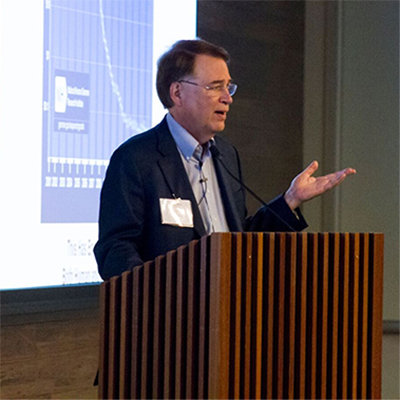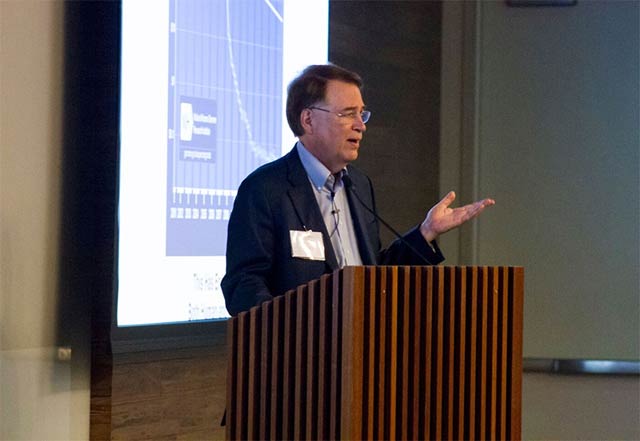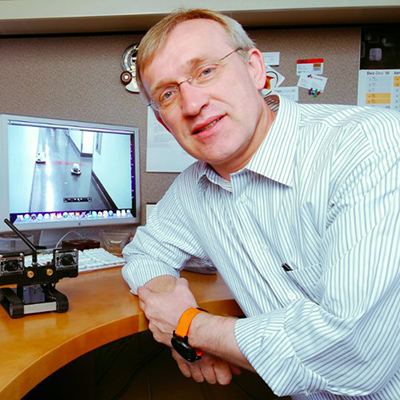
CSE professor and Calit2 director Larry Smarr laid out his "vision for a looming transformation in healthcare" at the recent Xconomy San Diego Forum on the Human Impact of Innovation, according to a May 2 report on the Xconomy.com news site. Smarr predicted that a "planetary" computer would be able to create a computational model of your body and run simulations of your health to anticipate chronic disease before you show any sign of having the condition. As reported in this excerpt from the article, Xconomy San Diego editor Bruce Bigelow recaps the presentations at the forum (reprinted here with permission):
While his expertise lies in computer networks and infrastructure, Smarr has emerged as a de facto leader in quantified health -- largely due to his relentless curiosity about his own health. In 2011 Smarr diagnosed his own Crohn's disease before he showed any symptoms.

Impact of Innovation. Photo by Melody Ozdyk / Xconomy
San Diego.
Smarr's work has contributed to a growing realization that the trillions of microbes in the human gut play a crucial role in maintaining human health. In his talk, Smarr dryly noted that the density of information in a fecal sample works out to roughly 1 billion microbes per gram of stool, encompassing a treasure trove of data that can be collected non-invasively every day. (The microbiome collectively contains 3.3 million genes-roughly 100 times more than the 23,000 genes of the human genome.)
This massive river of data would overwhelm conventional computing technology, but Smarr said a revolution in machine learning-based on a radically new (non-von Neumann) chip design-is now making it possible to analyze big data streams and monitor human health in unprecedented ways.
Google's first machine-learning chip is 30 times faster than conventional computer processors and graphics processors, Smarr said. As a result, Google and companies like San Diego-based KnuEdge, which is poised to roll out its neural-based AI technology sometime this year, and Intel's San Diego-based Artificial Intelligence Products Group (headed by former Nervana Systems CEO Naveen Rao) are moving toward the development of what he called "planetary" computers with Web-based AI capabilities.
Smarr said the promise of microbiome data as a way to predict chronic disease was demonstrated late last year by scientists at UC San Diego. Using machine learning technology, the team said, they had successfully trained a computer system to tell the difference between a person with a "healthy" intestine from someone with inflammatory bowel disease by analyzing the genetic makeup of the microbes in their gut.
Machine learning techniques also are being applied to X-rays and other medical imaging used in medical diagnostics. With such technology, Smarr said, "the worst radiologist with this kind of machine support would be better than the best radiologist without this support."

the roadmap for self-driving vehicles.
Machine learning was a recurring theme throughout the forum, with Intel's Urs Köster predicting that AI technology already is transforming healthcare, finance, retailing, transportation, energy, government, and other industries.
AI technology also has enabled the robotics technologies behind self-driving vehicles to advance more rapidly than expected, according to [CSE professor] Henrik Christensen, director of the Contextual Robotics Institute at UC San Diego... [In his presentation] Christensen predicted that autonomous, self-driving cars would be driving on U.S. roads by 2025. But significant technology hurdles must still be overcome, including the ability of machine vision systems to "see" through snowstorms and other tough weather conditions.
Other speakers at the forum included Dan Goldin, CEO of KnuEdge, which is partnering with Calit2 on the new Pattern Recognition Laboratory in the Qualcomm Institute. For more on talks by Goldin and other "luminaries" at the meeting...

